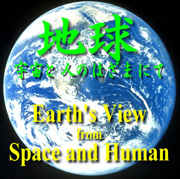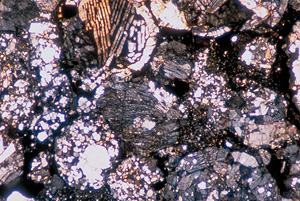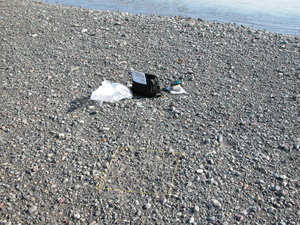

As a conclusion of the series of essays, let me introduce my recent
approach to nature. Those who have read my essays may have glimpsed it through
them but I have somewhat unique viewpoints as a geologist. And I thought introducing
the policy and method of my research is the best way to represent how I appreciate
nature as a geologist. So, let me introduce the outline of the theme of my research
as a conclusion.
I came to Hokkaido, the northern island of Japan in April 2002.
I took the opportunity to renew my research themes and decided to embark on
new ones from scratch. First, I classified my theme in three fields; geology,
science education and philosophy. And then, I examined research theme in each
field.
I have shifted subject area of the geological study to Hokkaido. I established a research theme which makes it possible to study the whole area of Hokkaido, not just limited to a specific area.
Then, I divided my study in three researches; first, study rubbles in riverbeds of all the 13 first-grade rivers in Hokkaido, respectively in upstream, middle stream and at mouth if possible. Second, collect naturally existing sand from rivers and seashores for study. At last, collect samples of representative rocks of 94 active volcanic mountains in Hokkaido and take pictures of them.
The three researches are somewhat out of line with those of the other geologists. In other words, geologists are not very earnest in study of these materials because they are not appropriate as subjects for scientific quest. However, I dared to choose such materials as a theme.
There is a reason for it. I had been aware that interests of scientists and themes that they are engaged are so much estranged from the viewpoints of interests among ordinary people toward nature. I have decided to throw myself in a study to fulfill the gap between curiosities of ordinary people and science. This is my research theme in science educational field.
What would you do if you were in a riverbed, which is full of pebbles? Maybe you will start collecting pebbles, throwing them in a river or bathing your feet in a river, almost unconsciously. Pebbles at riverside stimulate curiosity of people both adults and children. You will amuse yourself with sand and in ocean similarly in seashore too.
I wonder why such curiosity toward nature commonly held by people cannot be applied to science. What if a specialist starts explanation that these rubbles can be categorized in igneous rock, metamorphic rock and sedimentary rock, and that according to the chemical composition, igneous rock is further categorized in ...? You will instantly notice that the curiosity fades away as if a shining rock turns into just a colorless piece of stone.
It is not the phenomenon that takes place just in nature. Same thing happens in a laboratory too. By slicing a stone as thin as light can penetrate, you can view a beautiful and colorful micro world through a microscope. It is quite awesome. However, how do you feel once a specialist starts to explain that the mineral that causes colorful reflection like this is caused by amphibole and the change of color is caused by optical property when light goes through a crystal ...? Maybe you will feel that the beauty of the mineral is diminished and the brightness wanes.
Why it turns out like this? I think it is because there is a gap between the way that science is conveyed and the way that people find it interesting. Originally, nature is something that stimulates interest of people. Science is inherently interesting and search of science should also be interesting. The problem is that the interest is not rightly conveyed to people. There must be a way to better translate the interest of science. It should not be a transmission of knowledge but a way to share the interest in search of science, in a way of fulfilling the curiosity.
In that way, I, as a scientist too would be able to find a joy in the process of research. I felt a strong desire to convey the interests of science, while I myself experiencing it in my study. In other words, I want to convey what I felt interesting directly as it is to people, without any logics. This is the direction that I aim at in my research of science education.
Pebbles, sands and volcanoes are the resources I chose to explore the method. Of course as a geologist, I hope that such ubiquitous materials lead to bear fruit as a scientific finding. This theme also combines geological and educational purposes.
I am sure that records, samples and information I will be able to accumulate at the end of my research will benefit the interests of people, be enjoyable, as well as be accessible by everyone. Now I am digitalizing already collected data as a database called "the history of nature in Hokkaido" to integrate them as contents based on the real samples and opening it to public so that a lot of people can take advantage of it.
I am traveling all over Hokkaido for the above mentioned themes. Since I have other works as a professor of university and as a scientist belonging to other joint research, I have to manage to find time.
As the first step, I plan to research 13 first-grade rivers in the first 3 years of my life in Hokkaido. So far, I have been to rivers in central and southern part of Hokkaido, which are relatively close to where I live. I am enjoying the trial-and-error research process, since other geologists have never followed record taking and research method that I adopt.
I have another big research theme, which falls upon between geology and philosophy.
I am thinking about traveling in the world as much as possible to observe outcrops outstanding in geological history and rocks, stratums, occurrences and outcrops that are geologically considered the most important and typical. I won't focus on geological survey while visiting such places because I want to feel and meditate various things in the most geologically interesting places to deepen philosophical speculation in the perspective of geology. What I have in my mind is developing a discipline, which deserves to be called geological philosophy.
As part of a large framework of the geological philosophy, I think of focusing on a theme, "contemplating flow of time on earth" for the time being.
Among all the academic disciplines, I think geology best understands the transformation of "time", which is once and for all for the history of earth. It stands out as an important role of geology to provide a method to study the history of earth in a scientific and verifiable way. In other words, geologists are the ones that mull over and struggle the most in elucidating the passage of time on earth.
Nevertheless, philosophy based on geology fails to be established as an academic discipline so far. My dream is to realize it. I am planning to visit outcrops all over the world as long as time and money allows as a way of achieving the goal.
These are the themes of my study at present. Of course, a couple of them will be the ones that I have to be engaged all through my career. I am still in the learning process. I wonder when I will be able to look things based on the satellite viewpoint? When can I graduate from crawling on the ground? I am sure it takes long but now I am indeed enjoying the process of my research.
In the end, I would like to express my sincere gratitude for sharing your time with me reading the series of essays lasted for one year.
 |
 |
|
Picture-1
|
Picture-2 Investigation at riverbed
|
2003. December 1st
Yoshiyuki Koide
Copyright and ownership of picture-1, 2 and the text belong to Sapporo Gakuin University professor Yoshiyuki Koide. Permission from JSS is required of their use for other purposes.